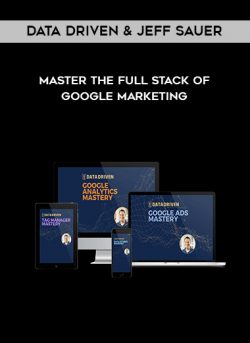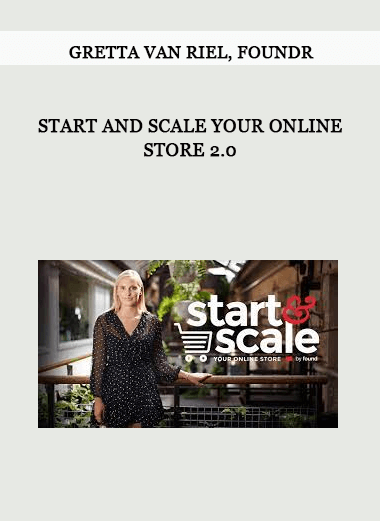Courses Infomation
Master The Full Stack of Google Marketing by Data Driven, Jeff Sauer
Master The Full Stack of Google Marketing by Data Driven, Jeff Sauer
**More information:
Description
Google Ads Mastery starts with the basics and quickly dives into the techniques used by long-time, expert advertisers. By the end of this program, you’ll know the techniques needed to run profit-driven advertising campaigns with Google Ads.
What you’ll learn in this course:
Discover how to build your Google Ads account to deliver profit generating data for every ad campaign your run, from day-1
Learn how to use your ad campaigns to find untapped keywords opportunities, so you can get more for your advertising budget
Leverage a proven system to calculate profitable budgets and optimize your bids without wasting money on ineffective tactics
Own a set of checklists that show you which metrics to focus on for management and when to make adjustments in your account, without spending all day inside Google Ads
Build your marketing credentials by earning your Google Search Advertising Certification and passing the test on your first attempt
Set yourself apart from the pack with your Data Driven Google Ads Mastery certification
Decipher the 3 paid search advertising strategies that matter so that you can outmaneuver your competitors and avoid “false-hope” bidding wars forever
Increase your conversions and reduce wasted ad spend using our Data Driven account management techniques
Who is this course for:
New advertisers who want to follow a proven process to get started in PPC management
Entrepreneurs and business owners who want to learn a system for profitable advertising on Google
Intermediate level advertisers who need to learn techniques that will allow them to increase their conversions and reduce wasted ad spend
Marketers who need to understand the metrics and methods behind profit-driven advertising on Google
Google Analytics Mastery teaches advertisers, marketers and business owners how to track and measure their website marketing. By the end of this course, you’ll understand how to use Google Analytics to improve your marketing results.
What you’ll learn in this course:
Leverage our 30-day system to make rapid improvements in your marketing capabilities
Acquire skills that allow you to gain a deeper understanding of your customers so you can increase your sales and conversions
Become a strategic thought-leader for your marketing team
Simplify tracking the metrics and data that matter so can reduce wasted time and lower costs
Automate your reporting so the answers you need are always in plain sight
Decipher advanced tracking and learn how to deploy the right data collection techniques for your needs
Own a set of skills that will become more and more in demand as digital marketing advances
Set yourself apart from the pack with a Data Driven web analytics certification
Enhance your marketing credentials by earning your Google Analytics certification
Who is this course for:
Brand new Google Analytics users who have never tracked website data before
Business owners and entrepreneurs who want take control of their website marketing and results
Freelancers and consultants who need to provide their clients with data-driven marketing solutions
Anyone who wants a step-by-step, comprehensive guide to Google Analytics that will help them go from beginner to advanced in 30 days
Tag Manager Mastery starts with the basics, and by the end of this training, you’ll understand how to unlock a whole new world of marketing insights.
What you’ll learn in this course
Save time and money tagging your website, while reducing tracking errors
Upgrade your analytics using three GTM power tools – tags, triggers and variables
Add 70+ advertising and analytics tools to your website using code-free tag templates
Enhance your website user experience by adding automatic event tracking to discover better ways to optimize your content marketing efforts
Measure the real value of your advertising campaigns using conversion pixel templates
Prevent your tracking code from going obsolete every time Google makes a change, by putting your Google tracking code updates on tag-template autopilot
Get immediately download Jeff Sauer – Master The Full Stack of Google Marketing
Test and debug your tracking in minutes, so you can confidently and quickly install your own tracking without having to wait on web development
Simplify your analytics, while getting direct access to better data to make better marketing decision
Implement techniques that will add immediate value to your business, increase the ROI of your marketing efforts, and maximize the earning potential of your organization
Who is this course for
Marketers who want immediate access to the data they need to do their job more effectively
Website owners and analysts who want to be able to track their site performance, without waiting days or weeks for web developers to put tracking tags on their site
Google Analytics users who want deeper, more valuable marketing insights that go beyond the “one size fits all” basic ins
What is SEO Traffic?
There are two types of website traffic:
Organic traffic: This is traffic that you don’t pay for directly. It includes people who click through to your website from your social media pages, your email newsletter, Google’s search results, and so on.
Paid traffic: This is traffic that you pay for directly. It includes people who click pay-per-click (PPC) ads, as well as those who hear about you through influencer marketing, newsletter or podcast sponsorships, and other forms of paid advertising.
SEO stands for search engine optimization, and is a process of optimizing your website with the goal of ranking higher on search engine results pages (SERPs) and ultimately increasing traffic.
In theory, the term SEO refers to all search engines, but in practice, it’s Google that matters most as they have an 87.35% share of the search market, with Bing being a very distant second at 5.53%, and Yahoo taking third place with 2.83% of the market.
SEO traffic is organic traffic that comes from search engines, in other words, people who typed a keyword or query into Google, looked through the search results, and then clicked through to your website.
Note that this doesn’t include paid search engine traffic, meaning those who entered a query into a search engine, and then clicked on your PPC ad that was displayed above the search results.
You can monitor organic traffic from SEO using tools like Google Analytics and Google Search Console. If you want to learn more about these tools, check out our guides on SEO Analytics and SEO Tracking.
Why Is SEO Traffic So Important?
Organic traffic comes from your online assets such as your social media following, your email newsletter, and your blog.
As you probably know, these assets take time to build, but over time the traffic you generate can often be much less expensive than paid traffic.
For example, it takes time to get a blog off the ground, but if you keep at it, the organic traffic can start to grow exponentially. Aas your SEO traffic grows over time, this means you may be able to reduce your paid advertising budget (or even eliminate it entirely!).
It’s important to keep in mind that SEO traffic isn’t free. You will need to either create content yourself, in which case you have to consider the cost of your time, or hire someone to create it for you.
However, you should see this as an investment, since content that ranks well on Google can generate traffic for years with minimal additional effort on your part (you may want to keep it updated, though).
Salepage : Master The Full Stack of Google Marketing by Data Driven, Jeff Sauer
































Reviews
There are no reviews yet.